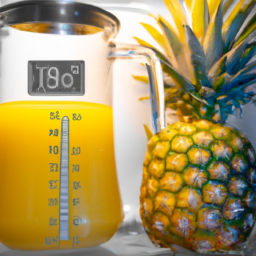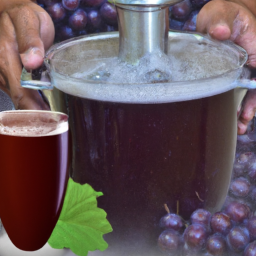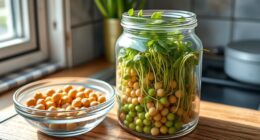As a home cook and baker, I often find myself thinking about how much juice I can get from a certain number of lemons. Whether it’s for making a zesty salad dressing or a lemon meringue pie, knowing how much juice to expect from lemons is crucial for accurate measurements and achieving the desired flavor.
In this article, I will explore the factors that affect lemon juice yield, provide general guidelines for estimating how much juice you can expect from your lemons, and offer tips for getting the most juice out of your fruit.
When it comes to lemon juice yield, there are a number of variables at play. Factors such as the ripeness of the fruit, the juicing method used, and the variety of lemon all contribute to the amount of juice you can expect to extract. By understanding these factors and employing some simple techniques for maximizing juice extraction, you can ensure that you’re getting the most out of your lemons and achieving optimal results in your cooking and baking endeavors.
So let’s dive in and explore the world of lemon juice yield!
Key Takeaways
- A typical lemon yields about 2-3 tablespoons of juice.
- Choosing heavy lemons with smooth, thin skin and using ripe lemons can increase juice yield.
- Rolling the lemon on a hard surface before juicing can help release more juice.
- Using a citrus juicer or reamer can extract juice more efficiently.
Factors Affecting Lemon Juice Yield
Did you know that the amount of juice you get from a lemon can be affected by various factors? As someone who’s spent a fair amount of time squeezing lemons, I can attest to the fact that the age, temperature, and ripeness of a lemon can make a big difference.
For example, older lemons tend to be dryer and have less juice, while lemons that are too ripe may be too soft to extract all of their juice. Additionally, the temperature of the lemon can affect the yield – for instance, warming a lemon in the microwave can make it easier to extract juice.
When it comes to lemon juice extraction, there are several techniques that can be used to maximize yield. One common method is to roll the lemon on a hard surface before slicing it open and squeezing it, as this can help to break apart the internal membranes and release more juice. Another technique is to use a citrus juicer or reamer, which can help to extract juice more efficiently.
By paying attention to these factors and using effective squeezing techniques, you can increase your chances of getting the most juice out of your lemons. With that said, let’s move on to some general guidelines for estimating lemon juice yield.
General Guidelines for Estimating Lemon Juice Yield
You can estimate how much lemon juice you’ll get by following these general guidelines. First, choose lemons that are heavy for their size and have smooth, thin skin. This indicates that the lemon is juicy and has a thin layer of pith, which can affect the yield of juice.
Additionally, lemons that are slightly soft to the touch are ripe and will yield more juice than underripe lemons. Another factor to consider is the type of citrus fruit being used. While lemons are a popular choice for their tart flavor, other citrus fruits such as limes and oranges can also be used as alternative sources of juice. However, it’s important to note that the yield of juice may vary depending on the fruit chosen.
For example, limes are smaller than lemons and may require more fruit to yield the same amount of juice. When estimating lemon juice yield, it’s also important to consider the tools needed for squeezing lemons.
Tools Needed for Squeezing Lemons
To efficiently extract the maximum amount of citrus juice, it’s recommended that you use a citrus squeezer or a hand-held juicer. There are several types of juicers available in the market, but for lemons, it’s best to use a tool specifically designed for citrus fruits. A citrus reamer is a simple tool that can be used to extract juice from lemons, limes, and oranges. It is a manual device that consists of a pointed end and a handle. To use it, you need to cut the lemon in half and place it on the pointed end. Then, you need to twist and turn the lemon while pressing it down on the reamer to extract the juice.
On the other hand, an electric juicer is a more sophisticated tool that can be used to extract juice from a variety of fruits and vegetables. It consists of a motorized device with a rotating cone that squeezes the fruit as it is pressed down onto the cone. Electric juicers can be expensive and bulky, but they are faster and more efficient than manual juicers. When it comes to lemons, both manual and electric juicers can be used to extract juice. However, if you only need to juice a few lemons, a manual citrus reamer might be a more practical and affordable option.
To get the most juice out of your lemons, there are several tips and tricks that you can follow. One of the most important things to do is to make sure that the lemons are at room temperature before juicing them. Cold lemons are harder to juice and yield less juice compared to lemons that are at room temperature. Additionally, rolling the lemons on a hard surface before cutting them in half can help release more juice. Another tip is to use a fork to poke the lemon flesh a few times before juicing it. This can help break down the cells and release more juice. By following these tips and using the right tools, you can extract the most juice out of your lemons and enjoy their tart and refreshing flavor in your favorite recipes.
Tips for Getting the Most Juice Out of Your Lemons
Getting the most juice out of your citrus fruit is like finding a hidden treasure, and one way to do it is by letting the fruit warm up to room temperature before juicing. Another tip is to choose ripe lemons. Ripe lemons are heavier and have thinner skin compared to unripe ones. You can also check if the lemon is ripe by giving it a gentle squeeze. If it feels soft, then it’s ready to be juiced.
Once you’ve chosen your lemons, it’s important to preserve their freshness. Store them in a cool and dry place, away from direct sunlight. You can also wrap them in a paper towel and place them in a plastic bag before storing them in the refrigerator.
By following these tips, you can ensure that your lemons are ready to be juiced when you need them. Now, let’s move on to how to measure lemon juice.
How to Measure Lemon Juice
Measuring lemon juice accurately is key in achieving the perfect balance of flavors in your recipe. Lemon juice is a versatile ingredient that can add a tangy and acidic flavor to a dish. However, using too much or too little can significantly affect the taste of your recipe. Therefore, it is essential to know how to measure lemon juice accurately.
One way to measure lemon juice is by using a measuring cup. A typical lemon yields about 2-3 tablespoons of juice, but this can vary depending on the size and ripeness of the fruit. To get the most juice out of your lemon, roll it on a hard surface before cutting it in half and squeezing it. Alternatively, you can use a juicer or a citrus reamer. Keep in mind that freshly squeezed lemon juice is the best option as it provides the most benefits of lemon juice, such as high levels of vitamin C and antioxidants. If you don’t have lemons on hand, some alternatives sources of citric acid include limes, oranges, grapefruits, and vinegar.
Recipes that use lemon juice often require precise measurements, so it is crucial to measure accurately. The next section will explore some recipes that use lemon juice and how to incorporate it into your dishes.
Recipes That Use Lemon Juice
Now that we know how to measure lemon juice, let’s talk about the different recipes that use it. Lemon juice is a versatile ingredient that can be used in sweet and savory dishes, as well as in beverages. It adds a bright, tangy flavor and also helps balance out other flavors in a dish. If you don’t have fresh lemons on hand, there are also lemon juice substitutes available, such as bottled lemon juice or vinegar.
One popular use for lemon juice is in cocktails. There are many popular lemon-based cocktails, such as the classic Whiskey Sour, Tom Collins, and Lemon Drop Martini. Lemon juice can also be used in non-alcoholic drinks, such as lemonade and iced tea.
In cooking, lemon juice can be used in salad dressings, marinades, and sauces. It pairs well with seafood, chicken, and vegetables. Overall, lemon juice is a versatile ingredient that can be used in a variety of recipes to enhance the flavor and bring a refreshing taste to any dish or drink.
Moving on to the next section, there are even more uses for lemons beyond just their juice.
Other Uses for Lemons
Did you know that you can use leftover lemon peels to make a natural cleaner for your home? Lemon based cleaning solutions are a great alternative to chemical cleaners, which can be harmful to both the environment and your health.
Here are three benefits of using lemon-based cleaning solutions:
-
Lemon juice is a natural disinfectant: Lemon juice contains citric acid, which is a natural disinfectant. It can kill bacteria and viruses, making it an effective cleaner for surfaces like countertops, cutting boards, and bathrooms.
-
Lemon juice removes stains: Lemon juice can be used to remove stains on clothes, carpets, and furniture. Its acidic properties can break down and dissolve stains, leaving your items looking clean and fresh.
-
Lemon juice leaves a fresh scent: Unlike chemical cleaners, lemon-based cleaning solutions leave a pleasant and fresh scent in your home. The natural fragrance of lemon can help to combat bad odors and leave your home smelling clean and inviting.
Aside from cleaning, there are also many benefits to drinking lemon water. It can help to boost your immune system, aid in digestion, and improve your skin’s appearance.
But how do you store lemon juice to ensure that it retains its beneficial properties?
Storing Lemon Juice
To keep your lemon juice fresh and full of flavor, you’ll want to store it in an airtight container in the fridge, like a mason jar with a tight-fitting lid, so it stays as zesty as the day you squeezed it. Preserving freshness is key when it comes to lemon juice, as it can quickly lose its flavor and potency if not stored properly. In addition to using an airtight container, it’s also important to keep the juice refrigerated at all times and to use it within a week for best results.
If you want to extend the shelf life of your lemon juice even further, you can also consider using freezing techniques. Freezing lemon juice can help to preserve its freshness and flavor for several months, making it a great option for those who want to have a ready supply on hand. Simply pour the juice into ice cube trays and freeze until solid, then transfer the cubes to a freezer-safe container or bag. When you’re ready to use the juice, simply thaw out the desired number of cubes and use as you would fresh lemon juice.
Moving on to the next section, let’s take a look at the different varieties of lemons and how they can affect the flavor of your juice.
Lemon Varieties
I’ll now discuss the different varieties of lemons commonly used in cooking and baking.
The Eureka Lemon is a popular variety known for its tart flavor and thick skin, which makes it great for cooking and juicing.
On the other hand, the Meyer Lemon has a sweeter flavor and thinner skin, making it perfect for use in cocktails and desserts.
Lastly, the Lisbon Lemon is a larger variety that has a tangy flavor and is commonly used for making lemonade and preserves.
Eureka Lemon
The Eureka lemon is a juicy and flavorful variety of lemon that’s commonly used in cooking and baking. Its acidic and tart flavor lends a unique taste to dishes and desserts, making it a popular ingredient in many recipes.
Here are some emotional bullet points that showcase the versatility and benefits of Eureka lemons:
- Bursting with tangy flavor, Eureka lemons add a zesty kick to any meal.
- From savory marinades to sweet lemon bars, this variety of lemon can be used in a wide range of dishes.
- In addition to its culinary uses, Eureka lemons are also rich in vitamin C and antioxidants, making them a healthy addition to any diet.
When it comes to lemons, the Eureka variety is a staple in many kitchens. However, there are other lemon varieties worth exploring, such as the Meyer lemon.
Meyer Lemon
With its sweeter flavor and thin skin, the Meyer lemon is a popular choice for cocktails and desserts. But did you know that it also has numerous health benefits?
Meyer lemons contain high levels of vitamin C, which boosts the immune system and promotes healthy skin. They are also rich in antioxidants, which protect the body against free radicals and reduce the risk of chronic diseases such as cancer and heart disease.
In terms of taste, Meyer lemons are less acidic than regular lemons, with a sweeter and more floral flavor. This makes them a great addition to sweet dishes like cakes and tarts. However, their unique taste also works well in savory dishes such as marinades and dressings.
Meyer lemons are a versatile ingredient that can add a bright and fresh flavor to any dish. Moving on to the Lisbon lemon, this variety is known for its thick skin and high juice content.
Lisbon Lemon
Indulge in the thick-skinned Lisbon lemon for its high juice content and versatility in cooking and baking. The Lisbon lemon is a popular variety known for its tangy and acidic flavor, making it ideal for a wide range of culinary applications.
Its juice is commonly used in marinades, dressings, and sauces. Its zest can be grated to add a bright citrusy flavor to baked goods and desserts.
To ensure that Lisbon lemons are harvested at their peak ripeness, they should be picked when the skin turns a bright yellow color and the fruit feels firm to the touch. Once harvested, they can be stored at room temperature for up to two weeks or in the refrigerator for up to a month. To preserve their flavor and juiciness, it’s recommended to wrap them in a paper towel and place them in a perforated plastic bag.
With its delicious flavor and versatile uses, the Lisbon lemon is a must-have ingredient in any kitchen.
Frequently Asked Questions
Are there any health benefits to consuming lemon juice?
Drinking lemon water has numerous benefits, including aiding in digestion, boosting immunity, and detoxifying the body. Lemon juice has been shown to have anti-inflammatory properties and can help lower blood pressure. Incorporating lemon juice into your diet can be a simple and effective way to improve your overall health.
What is the nutritional value of lemon juice?
As a nutritionist, I recognize the numerous health benefits of consuming lemon juice. It’s an excellent source of vitamin C, aids in digestion, and may even help with weight loss. I love incorporating it into my recipes for a zesty kick.
Can lemon juice be substituted for other types of citrus juice in recipes?
Yes, lemon juice can be substituted for other types of citrus juice in recipes. However, the best recipes for using lemon juice alternatives vary depending on the dish. Experiment with lime or orange juice for a different flavor profile.
How long can lemon juice be stored in the refrigerator?
Leftover lemon juice can be stored in a sealed container in the refrigerator for up to a week. To make lemonade, mix fresh lemon juice, water, and sugar to taste. Other ways to use leftover lemon juice include adding it to salad dressings or marinades.
Are there any special precautions to take when handling or cutting lemons?
As I prepare to handle lemons, I’m reminded of their high acidity levels. Proper handling and cutting techniques are crucial for lemon juice safety. Ensuring clean surfaces and sharp knives can reduce the risk of contamination and injuries.
Conclusion
In conclusion, squeezing lemons for their juice may seem like a simple task, but there are many factors that can affect the yield. By using the right tools, applying the right techniques, and choosing the right lemons, you can get the most juice out of your lemons.
As a lemon enthusiast, I’ve found that a good lemon squeezer and a bit of elbow grease can go a long way in maximizing juice yield.
Whether you’re using lemon juice for cooking, baking, or as a refreshing drink, it’s important to know how much juice you’re getting. With the general guidelines and measuring techniques outlined in this article, you can confidently measure out the right amount of lemon juice for your needs.
So go ahead, grab a lemon, and start squeezing! You never know what delicious recipe or drink you might create with the juice of just two lemons.
Aurelia is the Editor-in-Chief of The Graceful Kitchen, a vegan lifestyle blog that focuses on delicious, nutritious, and ethical eating. A lifelong vegan, Aurelia is passionate about sharing her love of plant-based cuisine with others. She is a regular contributor to several online and print publications, and has been interviewed by major news outlets about the benefits of a vegan diet. In her free time, Aurelia enjoys cooking, hiking, and spending time with her cats.








